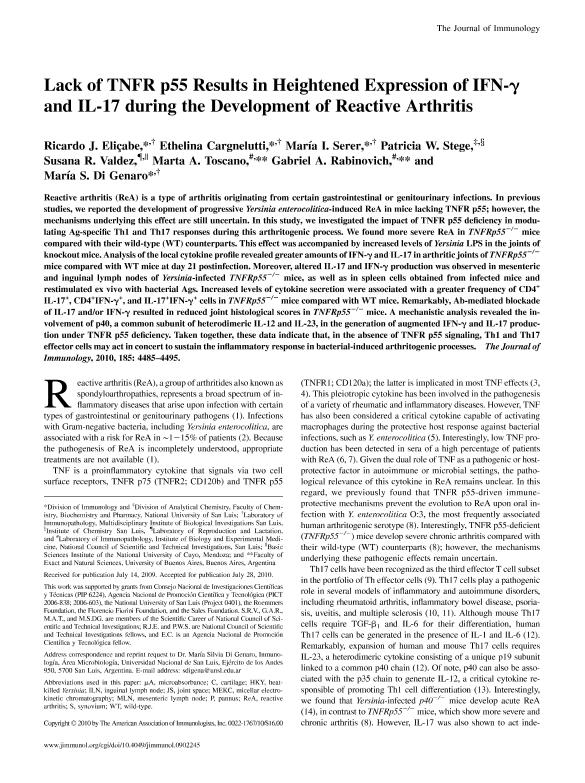Artículo
Lack of TNFR p55 results in heightened expression of ifn-γ and IL-17 during the development of reactive arthritis
Eliçabe, Ricardo Javier ; Cargnelutti, Ethelina
; Cargnelutti, Ethelina ; Serer, María Inés
; Serer, María Inés ; Stege, Patricia Wanda
; Stege, Patricia Wanda ; Valdez, Susana Ruth
; Valdez, Susana Ruth ; Toscano, Marta Alicia
; Toscano, Marta Alicia ; Rabinovich, Gabriel Adrián
; Rabinovich, Gabriel Adrián ; Di Genaro, Maria Silvia
; Di Genaro, Maria Silvia
 ; Cargnelutti, Ethelina
; Cargnelutti, Ethelina ; Serer, María Inés
; Serer, María Inés ; Stege, Patricia Wanda
; Stege, Patricia Wanda ; Valdez, Susana Ruth
; Valdez, Susana Ruth ; Toscano, Marta Alicia
; Toscano, Marta Alicia ; Rabinovich, Gabriel Adrián
; Rabinovich, Gabriel Adrián ; Di Genaro, Maria Silvia
; Di Genaro, Maria Silvia
Fecha de publicación:
10/2010
Editorial:
American Association of Immunologists
Revista:
Journal of Immunology
ISSN:
0022-1767
Idioma:
Inglés
Tipo de recurso:
Artículo publicado
Clasificación temática:
Resumen
Reactive arthritis (ReA) is a type of arthritis originating from certain gastrointestinal or genitourinary infections. In previous studies, we reported the development of progressive Yersinia enterocolitica-induced ReA in mice lacking TNFR p55; however, the mechanisms underlying this effect are still uncertain. In this study, we investigated the impact of TNFR p55 deficiency in modulating Ag-specific Th1 and Th17 responses during this arthritogenic process. We found more severe ReA in TNFRp55-/- mice compared with their wild-type (WT) counterparts. This effect was accompanied by increased levels of Yersinia LPS in the joints of knockout mice. Analysis of the local cytokine profile revealed greater amounts of IFN-γ and IL-17 in arthritic joints of TNFRp55-/- mice compared with WT mice at day 21 postinfection. Moreover, altered IL-17 and IFN-γ production was observed in mesenteric and inguinal lymph nodes of Yersinia-infected TNFRp55-/- mice, as well as in spleen cells obtained from infected mice and restimulated ex vivo with bacterial Ags. Increased levels of cytokine secretion were associated with a greater frequency of CD4+ IL-17+, CD4 +IFN-γ+, and IL-17+IFN- γ+ cells in TNFRp55-/-mice compared with WT mice. Remarkably, Ab-mediated blockade of IL-17 and/or IFN-γ resulted in reduced joint histological scores in TNFRp55-/- mice. A mechanistic analysis revealed the involvement of p40, a common subunit of heterodimeric IL-12 and IL-23, in the generation of augmented IFN-γ and IL-17 production under TNFR p55 deficiency. Taken together, these data indicate that, in the absence of TNFR p55 signaling, Th1 and Th17 effector cells may act in concert to sustain the inflammatory response in bacterial-induced arthritogenic processes.
Palabras clave:
Rodent
,
Cytokine receptors
,
Cytokines
,
Bacterial infection
Archivos asociados
Licencia
Identificadores
Colecciones
Articulos(IBYME)
Articulos de INST.DE BIOLOGIA Y MEDICINA EXPERIMENTAL (I)
Articulos de INST.DE BIOLOGIA Y MEDICINA EXPERIMENTAL (I)
Articulos(IMIBIO-SL)
Articulos de INST. MULTIDICIPLINARIO DE INV. BIO. DE SAN LUIS
Articulos de INST. MULTIDICIPLINARIO DE INV. BIO. DE SAN LUIS
Articulos(INQUISAL)
Articulos de INST. DE QUIMICA DE SAN LUIS
Articulos de INST. DE QUIMICA DE SAN LUIS
Citación
Eliçabe, Ricardo Javier; Cargnelutti, Ethelina; Serer, María Inés; Stege, Patricia Wanda; Valdez, Susana Ruth; et al.; Lack of TNFR p55 results in heightened expression of ifn-γ and IL-17 during the development of reactive arthritis; American Association of Immunologists; Journal of Immunology; 185; 7; 10-2010; 4485-4495
Compartir
Altmétricas



